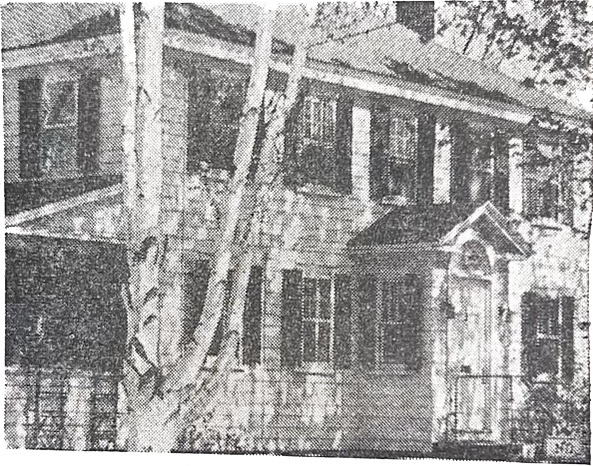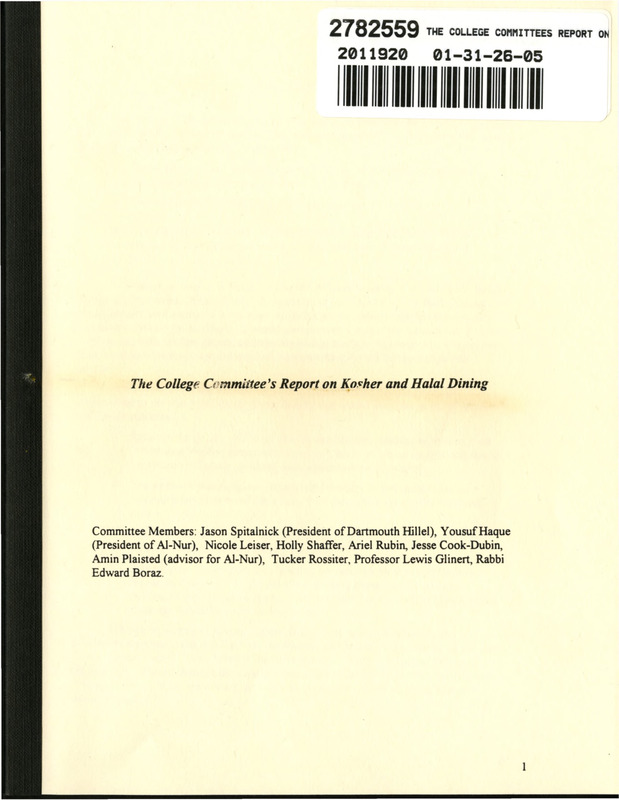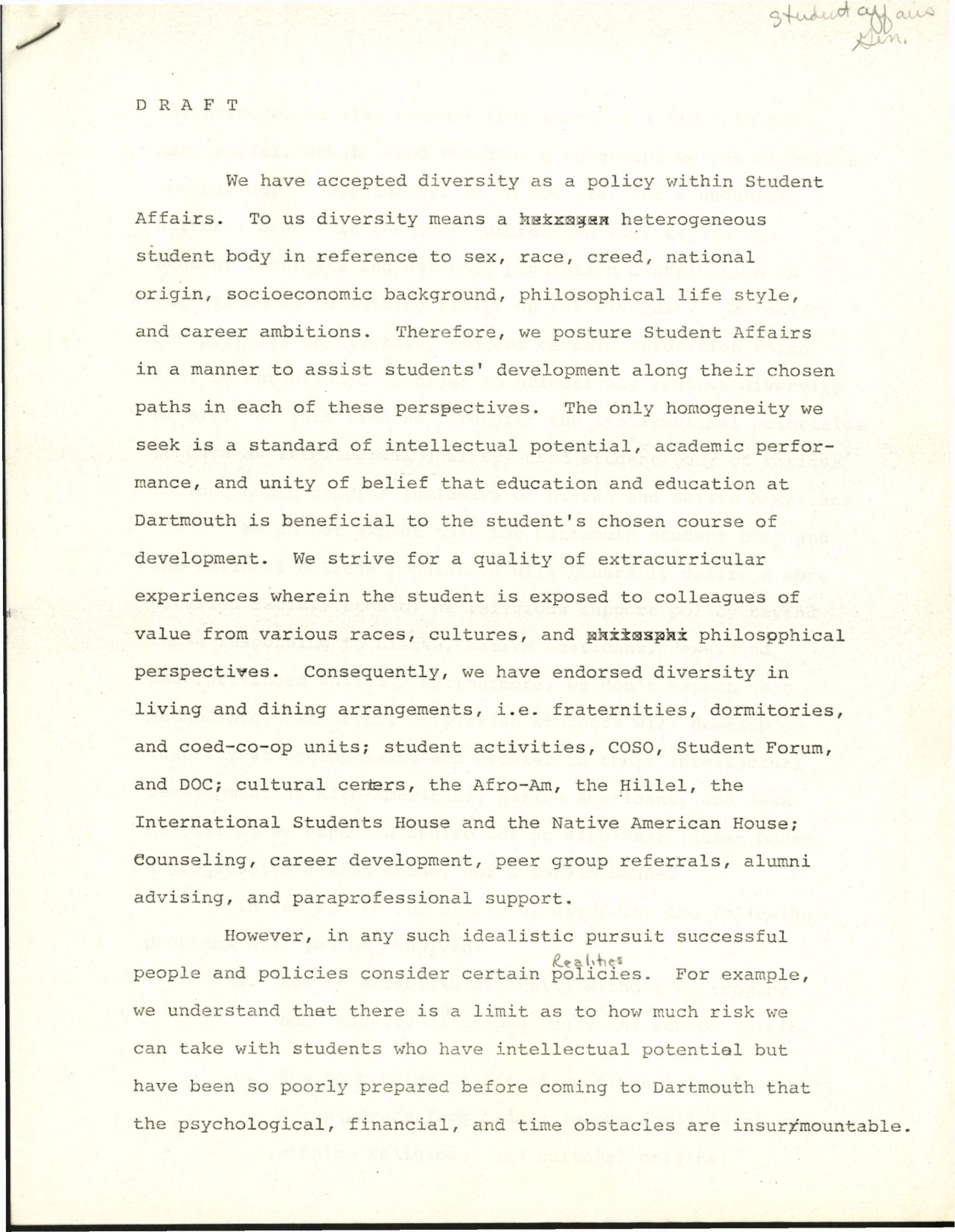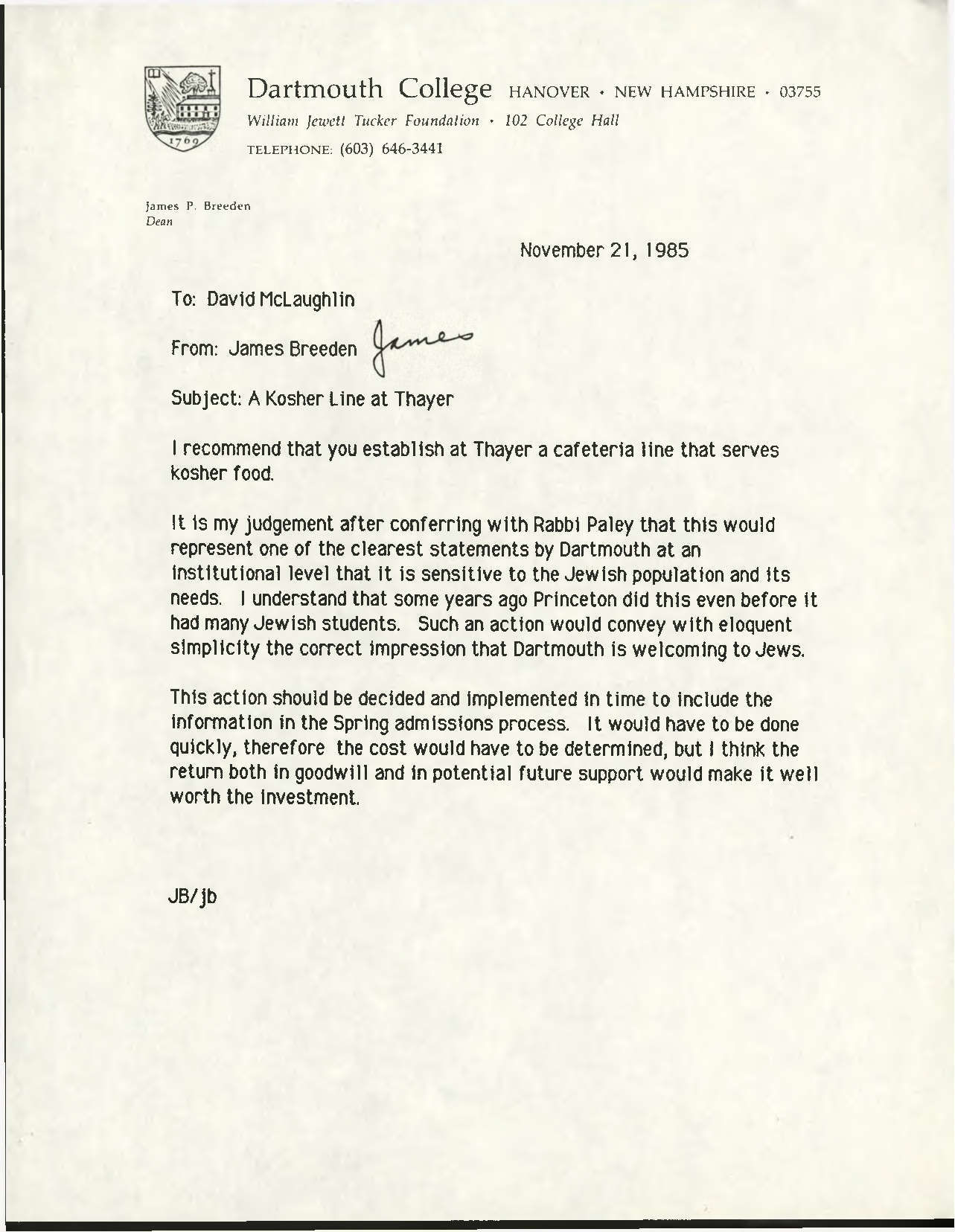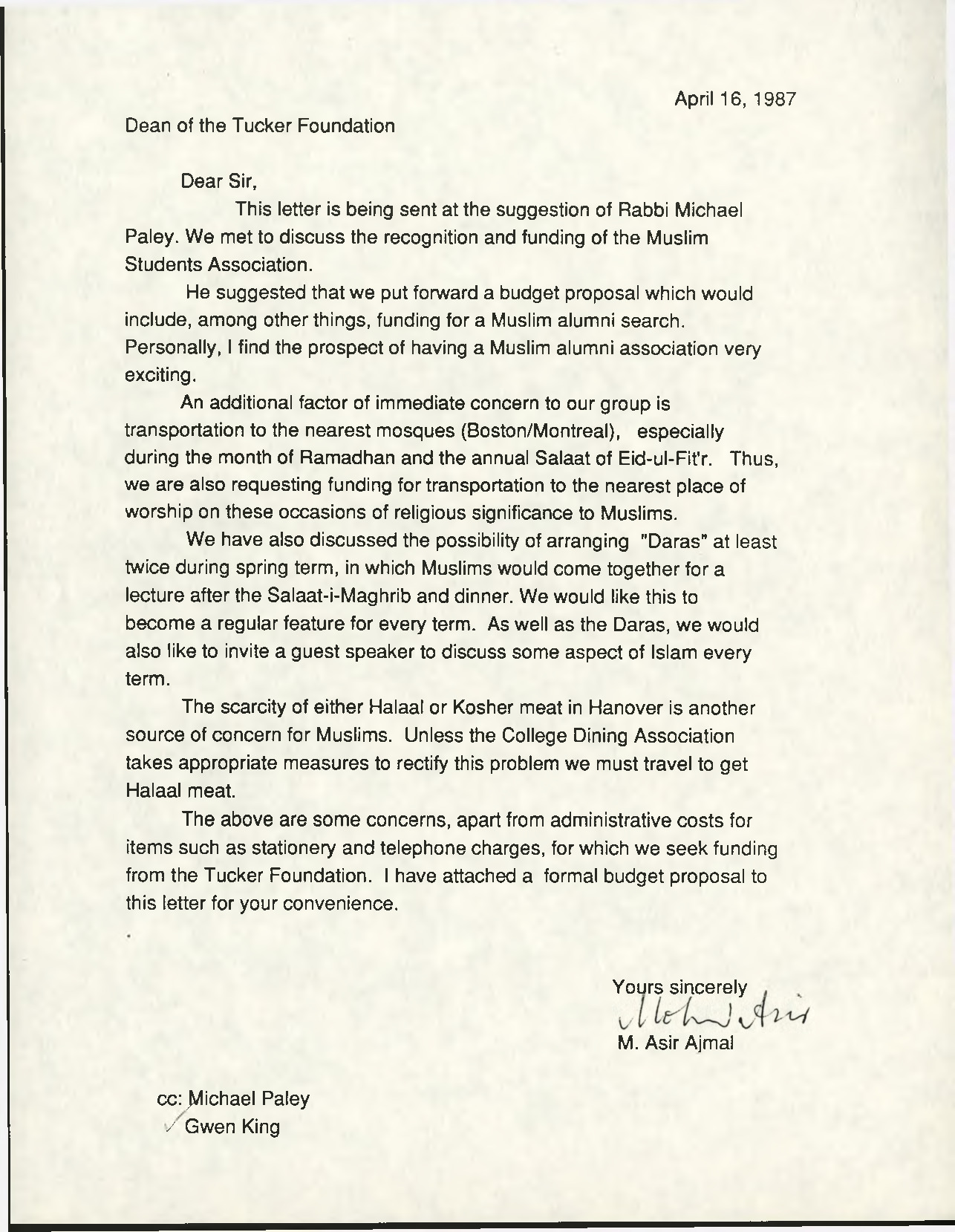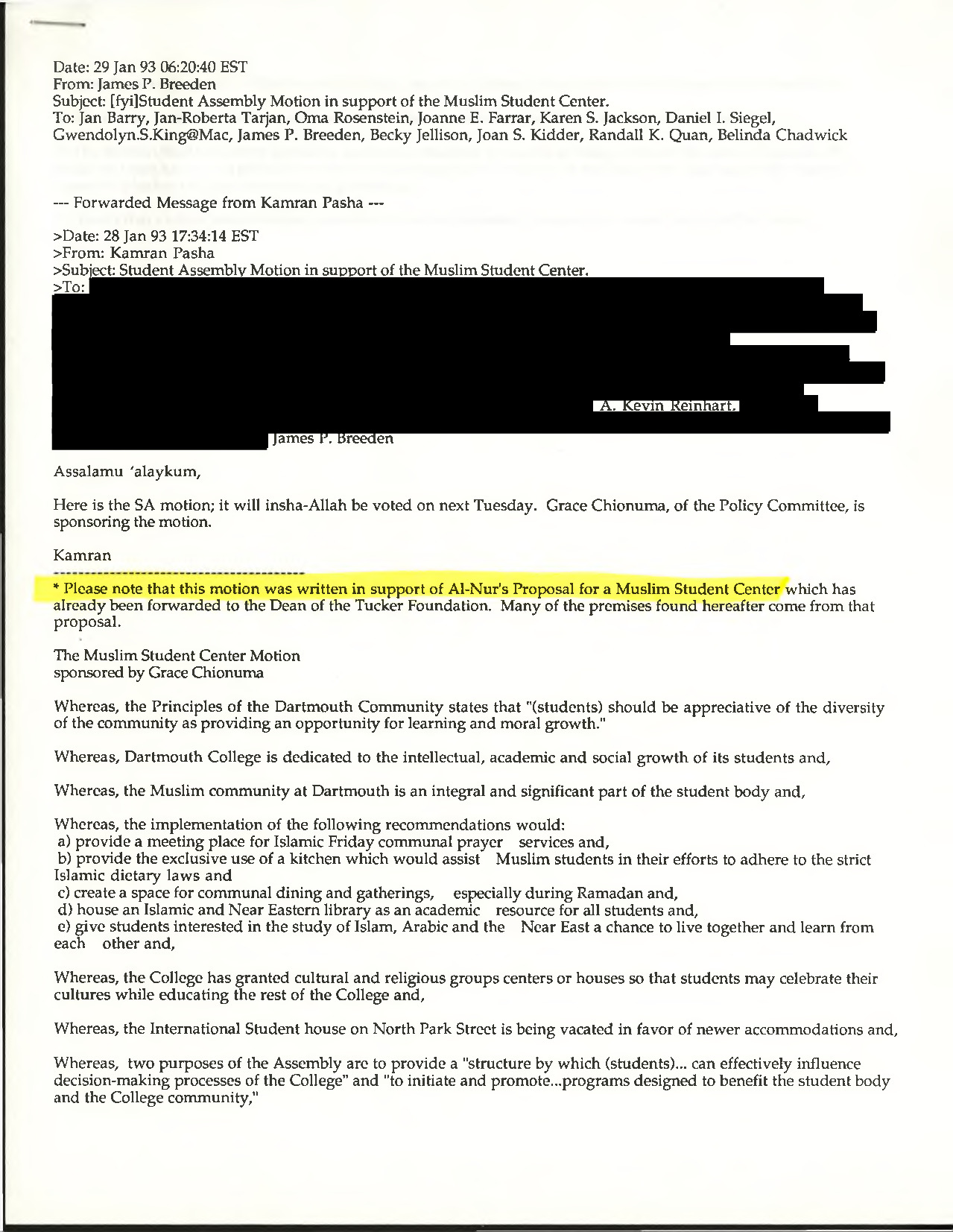20th-Century Kosher & Halal Dining
Keeping Kosher and Halal are meaningful practices associated with Judaism and Islam, respectively, and students adhering to these dietary requirements have faced trouble finding adequate food to eat. Students and staff have historically been vocal about their issues and suggestions for dining at Dartmouth and eventually, Dartmouth administrators listened to these calls for change. Dining directors recognized Dartmouth’s shortcomings and the impact these deficiencies had on the student body, and they began to undertake initiatives to enhance dining offerings.
More intentional administrative strides toward establishing diversity and inclusion began in the late ‘60s. The Board of Trustees initiated the first Committee on Equal Opportunity in 1968, headed by John McLane; one year later, then-professor John Kemeny chaired a second committee aimed at putting McLane’s recommendations into practice. Kemeny and other leaders worked to “increase financial aid, actively recruit minority students and faculty, develop an African-American Studies program, and convert the Nathan Lord House into an African-American cultural center.”3 A draft from the Vice President and Dean for Student Affairs Office indicates that the College also decided that diversifying “living and dining arrangements” aligned with their goal of creating a “heterogeneous” campus. This draft is undated, but it was found in a folder of documents created between 1972 and 1973.
“The Hillel House is perfectly consistent with the stated policy of diversity, coed-co-op living and dining arrangements.”
In this same document, the author declared that “Jewish students are an identifiable, continuing, and desirable minority at Dartmouth.” The writer realized that the “absence of kosher facilities” and its negative impact on Jewish students contradicted their commitment to diverse living and dining options and a diverse student body. The Office of Student Affairs resolved this inconsistency and agreed to the creation of the Hillel house; administrators concurred that “the Hillel House [was] perfectly consistent with the stated policy of diversity, coed-co-op living and dining arrangements.”4 An article by Bob Lande from The Dartmouth announced on May 11, 1973, that “a house [would] be made available for” Dartmouth Hillel.5
The four students who lived in the house were required to maintain “strict Jewish dietary rules.” Before this housing arrangement, “the Hillel [had to] cook its meals with special utensils at a kitchen within the Episcopal church and carry the food back to College Hall.” Michael Cannick, then president of the Hillel, explained that “‘the College discriminate[d] against Orthodox Jews who want[ed] to eat Kosher.’” Dartmouth Hillel “ha[d] been attempting to get its own house for … four years,” but made a more “concerted effort” in the previous year. Making this house available for Hillel’s use was a step in the direction of establishing food inclusivity at Dartmouth.6
However, while Kosher students’ dietary needs were met, establishing the only Kosher kitchen far from the center of campus was exclusionary to some extent. Students who kept Kosher were not able to eat with others and build relationships over food.
Twelve years later, James Breeden, Dartmouth’s former Dean of the Tucker Foundation, encouraged then President David McLaughlin to “establish at Thayer [Dining Hall] a cafeteria line that serve[d] kosher food.” In this 1985 letter, he explained that “this would represent one of the clearest statements by Dartmouth at an institutional level that it is sensitive to the Jewish population and its needs.” It is evident that Dean Breeden looked to improve Jewish students’ well-being with a Kosher cafeteria line at Thayer Dining Hall, which is now known as the Class of 1953 Commons. However, Breeden also found that Kosher food in the center of campus would improve Dartmouth’s image. He suggested that this “action should be decided and implemented in time to include the information in the Spring admissions process.”7 This would demonstrate Dartmouth's commitment to inclusivity and enhance its reputation among prospective students and the world.
Two years following this recommendation, Breeden received a letter from Asir Ajmal, a graduate student who founded Al-Nur, the Muslim Students Association. After describing other requests on Al-Nur’s behalf, Asir explained that the “scarcity of either Halaal or Kosher meat in Hanover [was] another source of concern for Muslims.” He expressed that Al-Nur was going to have to continue “travel[ing] to get Halaal meat” “[u]nless the College Dining Association [took] appropriate measures to rectify this problem.”8 Al-Nur’s reliance on external sources for Halal meat underscored Dartmouth’s lack of such food within its dining facilities. Dartmouth needed to improve: students should not have to travel away from campus to get the food they need.
“The scarcity of either Halaal or Kosher meat in Hanover is another source of concern for Muslims. Unless the College Dining Association takes appropriate measures to rectify this problem we must travel to get Halaal meat.”
Asir Ajmal, President of Al-Nur
In 1991, Dartmouth finally established a Kosher deli in Thayer Dining Hall. An article from Valley News clarifies that Thayer opened this deli “following requests from Jewish Chaplain Daniel Siegel and students.” The article explained that “Jewish students primarily frequent[ed] the deli” and that it was also “popular with Muslim students, who observe similar dietary guidelines.”9 Unfortunately, in 1996, Thayer lost its Kosher delicatessen, for it “‘seemed that the price of the Kosher deli was just too high and students were not willing to pay for it.’”10 Because food — barring the Full Fare station — was served a la carte at Thayer at this time, students had to pay more for Kosher food, for Kosher fare was more difficult and expensive for the College to acquire. Therefore, while Dartmouth improved food options for Jewish and Muslim students, the food was not necessarily accessible for all.
Despite the deli’s construction and its Kosher offerings, Kosher food does not necessarily meet the Halal requirements. In other words, eating Kosher food does not necessarily break Islamic rules, but Halal food more closely meets Muslims’ needs. In 1993, Al-Nur worked with the Student Assembly to propose a motion for the establishment of a Muslim Student Center. Muslim students and Assembly members agreed that the creation of a Muslim Student Center would “provide the exclusive use of a kitchen [and] assist Muslim students in their efforts to adhere to the strict Islamic dietary laws.”11 Not only would this kitchen provide a Halal food option, but it would also mitigate the cost and accessibility issues the Kosher deli posed. Although it is unclear whether this motion was passed, this document demonstrates the limited or nonexistent financially accessible Halal food options at Dartmouth in the '90s.
Students working together to create changes in religious dining options was becoming more common in the final decade of the 20th century. In the late '90s, Jewish and Muslim students began working together to fight for a religious dining facility. They formed a committee, which included Jason Spitalinck (then president of Dartmouth Hillel), Yousef Haque (then president of Al-Nur), and Rabbi Edward Boraz, among others. Their research and advocacy led them to produce a document called “The College Committee’s Report on Kosher and Halal Dining.”
In this report, they first addressed the availability of Kosher and Halal food options at Dartmouth. The Roth Center for Jewish Life, which opened in 1997, provided a larger Kosher kitchen closer to the center of campus. However, options outside the Roth Center were bleak. The committee recognized DDS and Hillel’s efforts but explained that “existing facilities [did] not satisfy orthodox standards of Kashrut.” Except on “religious holidays and Friday evening services, Kosher dining [at Dartmouth was] marginal at best.” Dartmouth offered “Kosher sandwiches and microwavable dinners,” but the use of non-Kosher products in microwaves “render[ed] both the microwave and food subsequently warmed in it to be unfit.” For Muslim students, the student committee relayed that “there [were] no Halal products presently available.”12
Dartmouth administration aimed to promote inclusivity through former President James Wright’s Student Life Initiative (SLI) in February of 1999. This initiative led them to prioritize accommodating a broader range of dietary needs. Following the report on Kosher and Halal dining, the College announced in November of 2000 that “‘Muslim and Jewish students forge[d] a ground-breaking agreement for a joint Halal-Kosher dining facility’ to be located in Thayer Hall.” College leaders established that this dining outlet live in the Collis Center, Robinson Hall, or Thayer Hall: it should reside in a “primary campus dining venue.”13 Administrators wanted those with these dietary requirements to feel fully integrated into the campus community. This indicates the College’s efforts to make dietary needs — and religious identities — welcome at Dartmouth.
_______________________
3 “JOHN KEMENY So Smart. So Cool. So Dartmouth.,” Dartmouth College Mathematics, accessed March 7, 2024, https://math.dartmouth.edu/news-resources/history/kemeny-history/theman/diversity.html.
4 Draft on Diversity, Student Affairs Office. DA-8, Box 8454, Vice President and Dean for Student Affairs General, 01/01/1972 -12/31/1973. Dartmouth College, Dean of the College records. Rauner Special Collections Library, Hanover, NH.
5 Bob Lande, “Dickerson Affirms House For Jewish Student Group,” The Dartmouth, May 11, 1973.
6 Ibid.
7 Breeden, James. Dean of the Tucker Foundation Letter to Dartmouth President David McLaughlin. November 21, 1985. DA-114, Box 1886, Jewish Student Life Tucker Foundation. Tucker Foundation records. Rauner Special Collections Library, Hanover, NH.
8 Ajmal, Asir. Founder of Al-Nur's Letter to Dean of the Tucker Foundation. April 16, 1987. DA-114, Box 9598, Al-Nur, Tucker Foundation. Tucker Foundation records. Rauner Special Collections Library, Hanover, NH.
9 Ellen Swain, “Dartmouth’s Religious Diversity,” The Valley News, July 31, 1994.
10 Michelle Greg, “DDS Evolves, Makes Summer Changes,” The Dartmouth, September 27, 1996.
11 Pasha, Kamran. “Student Assembly Motion in support of the Muslim Student Center.” January 29, 1993. DA-114, Box 1879, Al Nur Tucker Foundation. Tucker Foundation records. Rauner Special Collections Library, Hanover, NH.
12 Boraz, Edward et. al. “The College Committee's Report on Kosher and Halal Dining.” DA-798, Box 30887, The College Committees Report on Kosher & Halal Dining. Dartmouth College, Hillel records. Rauner Special Collections Library, Hanover, NH.
13 Student Life Initiative Planning Document. DA-8, Box 30373, SLI SOCIAL DINING. Dartmouth College, Dean of the College records. Rauner Special Collections Library, Hanover, NH.
 Historical Accountability Student Research Program
Historical Accountability Student Research Program
